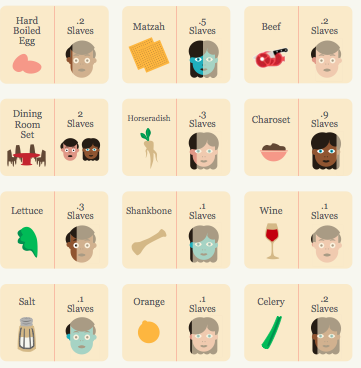Source: The Huffington Post
Posted: 04/ 4/2012 7:28 am

This year, I keep getting questions about chocolate.
Passover seems to be the annual peak of Jewish chocolate consumption (perhaps because it makes an easy dessert when many of us find baking without flour difficult), and for the ethical, kosher-keeping consumer, a tension emerges. There is kosher-for-Passover chocolate. There is kosher fair-trade chocolate. But there is no kosher-for-Passover, fair-trade chocolate. Why is this important? There is a well-documented child labor and child slave labor problem in the cocoa fields of the Ivory Coast, and it seems hypocritical to celebrate Passover by eating a product with such a problematic supply chain. The website Fair Trade Judaica has created a petition (with more than 300 signatures so far) demanding ethically produced chocolate for next Passover. And some of my friends are forgoing chocolate this year.
Then there are the tomatoes. Florida, where almost all of our October to May tomatoes are grown, has been called "ground zero" for modern slavery in America because of the high number of human trafficking cases that have been found in the fields. One federal prosecutor even said that one could guarantee that a Florida tomato had been picked by forced labor. Thanks to the amazing work of the Coalition of Immokalee Workers, more than 90 percent of Florida's tomato growers have begun to implement Fair Food Agreements that include a zero tolerance policy for forced labor and human trafficking in the tomato fields, among other basic protections of human rights. But so far, only two grocery stores (Whole Foods and Trader Joe's) have agreed to only buy Florida tomatoes from growers who have signed these agreements. So your grocery store might still be carrying slave-picked tomatoes -- and you would never know.
The list of products produced by forced labor could go on and on. Fish from Asia. Cotton from Uzbekistan. Tea from Uganda. As a consumer, there is just no way to know whether there is forced labor in the supply chains of the products we buy every day. Each autumn, the Department of Labor releases a list of goods produced by child or forced labor (in 2011, 130 goods from 70 countries), but does not provide details of specific brands or companies. Fair Trade certification is often (but not always) a proxy for ethically produced goods, but the number of products available is small and largely made up of luxury goods. For those of us who keep kosher and are used to looking for a heksher (a symbol of kosher supervision in production) on the food we buy, we wish that we could have a "slavery-free" heksher to help us when we shop. No one wants to be enjoying a delicious piece of chocolate or savoring a tomato and wondering if it was the result of slave labor, especially not at a meal dedicated to liberation like the seder.
This lack of transparency is extremely frustrating. We all might think that because we don't employ any slaves, we lack complicity in the human rights atrocity of modern slavery (with estimates of forced labor worldwide ranging from 12 million to 27 million people), but because of the degree of slave-made materials in the supply chains of products we buy every day that just isn't true. Many corporations fail to adequately police their supply chains, relying on the assurances of third party contractors or suppliers.
It is for this reason that the organization Slavery Footprint designed tools to empower consumers to demand products made without slave labor. By creating a visible demand in the market place, consumers can use their power to affect change on a system that enslaves millions.


Slavery Footprint's website allows people to visualize how their consumption habits are connected to modern-day slavery. You take an inventory of the goods in your home, and receive a score of how many slaves work to produce your lifestyle, based on what you own. Then, through the online action center and the "Free World" mobile application, you can take practical steps to demand products Made In A Free World by asking companies to check their supply chains for slave labor. Slavery Footprint's call to arms is for the ability for to buy things "Made in A Free World."
My organization, Rabbis for Human Rights-North America, has partnered with Slavery Footprint to produce an activity for Passover based on the larger Slavery Footprint survey. It can bedownloaded from our website for free. Ask your seder guests the question: How many slaves produced the goods on our table? Challenge them to commit to take action.
As the seder begins, we say metaphorically, "This year, we are slaves. Next year, may we be free people." Let us hope that by next Passover, our feasts of liberation will be made without slave labor and that more people will be free.


No comments:
Post a Comment